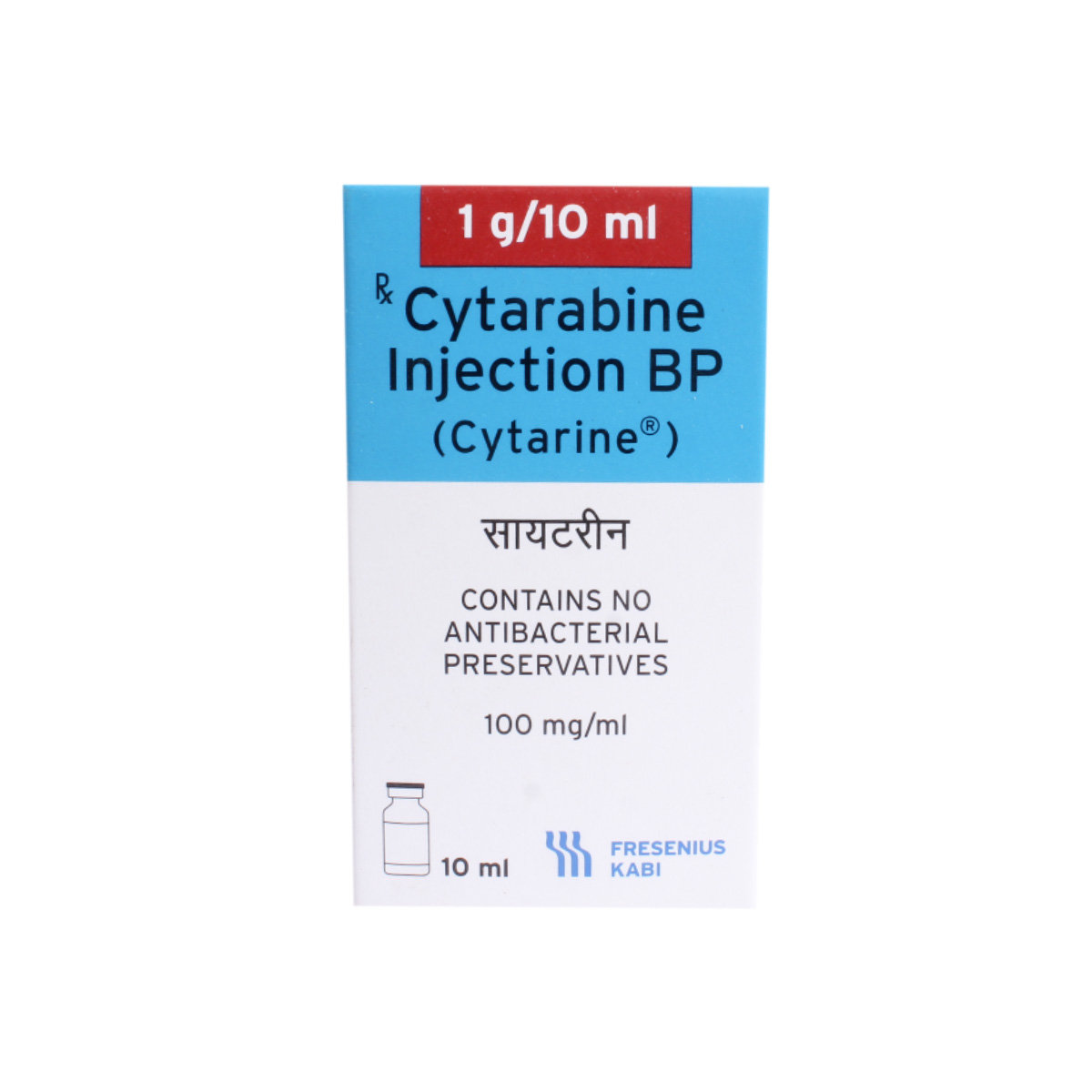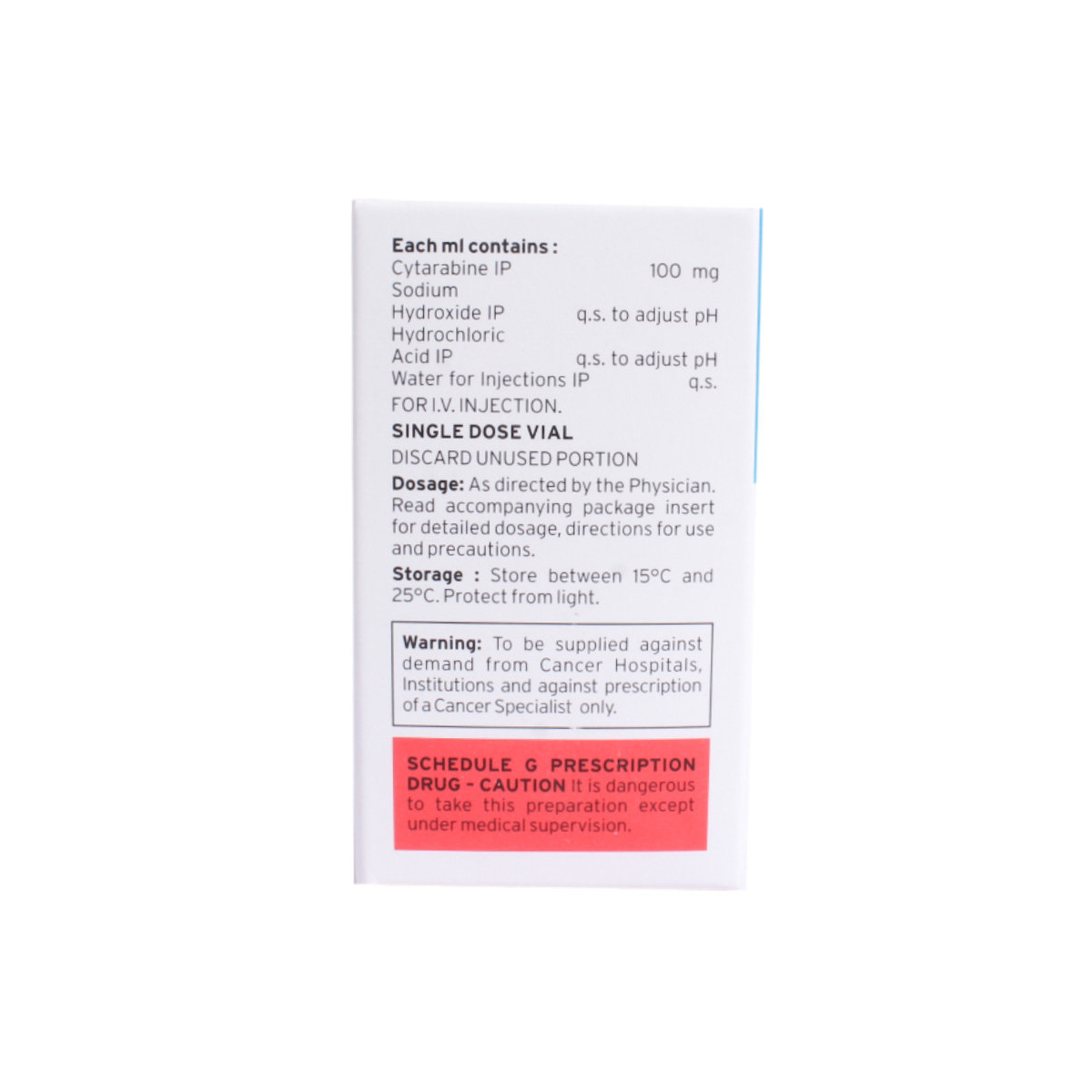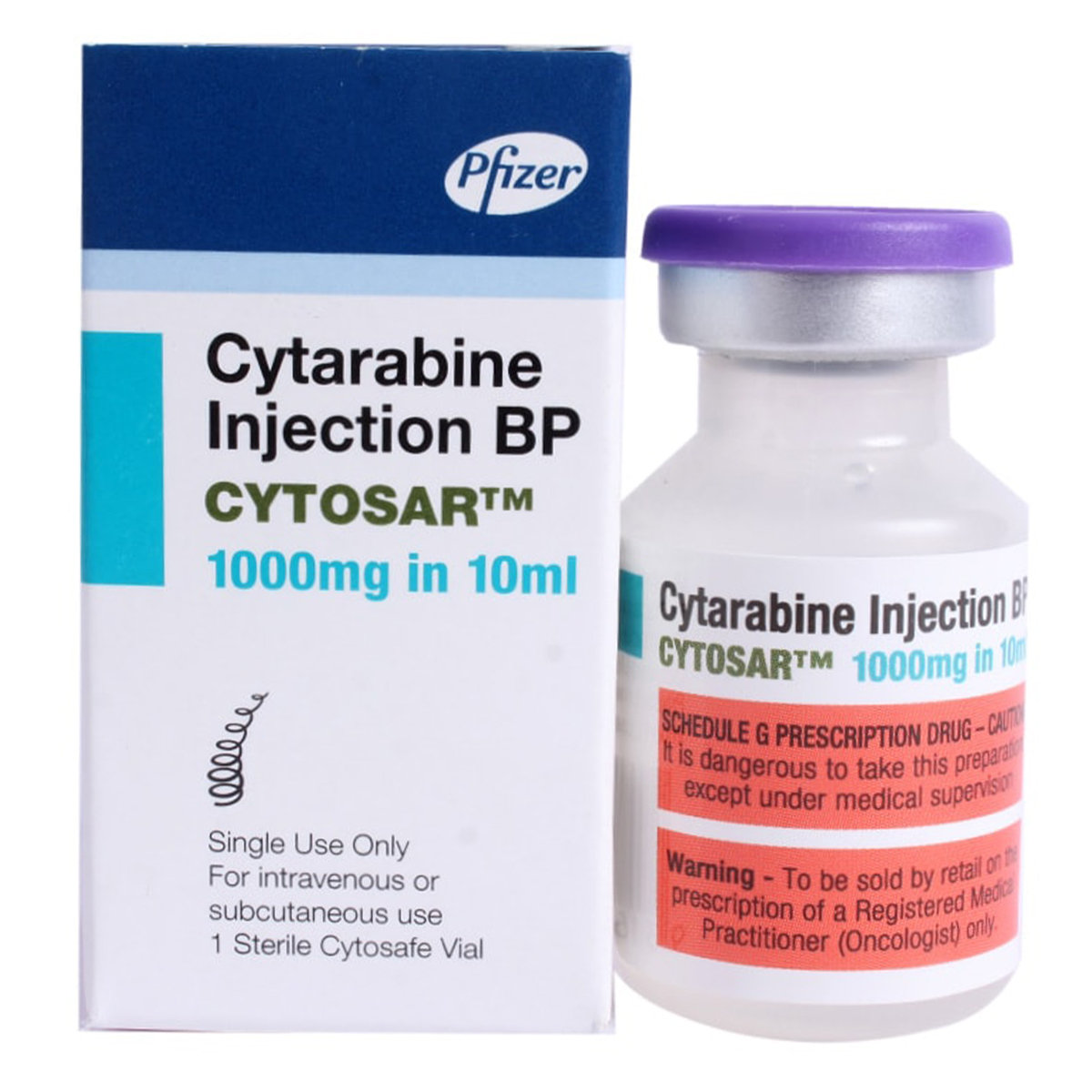CYTARINE INJECTION 1GM
MRP ₹436.11
(Inclusive of all Taxes)
₹52.3 Cashback (12%)
Provide Delivery Location

secured payment

india's most trusted pharmacy

genuine products
Composition :
Manufacturer/Marketer :
Consume Type :
Expires on or after :
Return Policy :
About CYTARINE INJECTION 1GM
CYTARINE INJECTION 1GM is an anticancer medicine used in the treatment of leukemia. Leukemia, also known as blood cancer, is a cancer of blood cells or blood-forming tissues. It causes excessive production of immature white blood cells by the bone marrow and reduces the body’s ability to fight infections. CYTARINE INJECTION 1GM is used in the treatment of different types of leukemias, such as acute non-lymphocytic leukemia, acute lymphocytic leukemia, chronic myelocytic leukemia and meningeal leukemia.
CYTARINE INJECTION 1GM contains Cytarabine, which belongs to the class of antimetabolites. It works by inhibiting the DNA polymerase enzyme responsible for DNA elongation, synthesis, and repair. In general, it inhibits the production of genetic material (DNA) in the cancer cells that are essential for the growth, repair and multiplication of cells. Thus, CYTARINE INJECTION 1GM stops the multiplication of abnormal cells, leads to the growth of cells in an unbalanced way and causes the death of cells.
CYTARINE INJECTION 1GM may cause certain side effects such as vomiting, nausea, mouth ulcers, loss of appetite, diarrhea, dark-coloured urine, stomach pain, hair loss, dizziness, weakness, and pain at the site of injection, prescribed by your doctor. Most of these side effects of CYTARINE INJECTION 1GM do not require medical attention and gradually resolve over time. However, if the side effects persist or worsen, please seek medical help. A trained healthcare professional will administer CYTARINE INJECTION 1GM. Hence, do not self-administer.
If you are allergic to CYTARINE INJECTION 1GM, inform your doctor and avoid taking it. Inform your doctor about your complete medical and medication history before starting treatment with CYTARINE INJECTION 1GM. CYTARINE INJECTION 1GM is contraindicated for pregnant women and breastfeeding women due to serious embryo-fetal toxicity. Hence, inform your doctor if you are pregnant, planning to become pregnant or breastfeeding. Inform your doctor if you have/had kidney or liver disease. Avoid alcohol consumption with CYTARINE INJECTION 1GM as it may increase the risk of liver damage. Avoid excessive exposure to sunlight as CYTARINE INJECTION 1GM may cause sensitivity to sunlight. You are advised to use sunscreen and wear protective clothing while going out.
Uses of CYTARINE INJECTION 1GM

Have a query?
Directions for Use
Key Benefits
CYTARINE INJECTION 1GM contains Cytarabine, which belongs to the class of antimetabolites. It works by inhibiting the DNA polymerase enzyme that is responsible for DNA elongation, synthesis, and repair. In general, it inhibits the production of genetic material (DNA) in the cancer cells that are essential for cell growth, repair and multiplication. Thus, CYTARINE INJECTION 1GM stops the multiplication of abnormal cells, leads to the growth of cells in an unbalanced way and causes the death of cells.
Storage
- Inform your doctor immediately if you experience a fever after starting a new medication.
- Your doctor may adjust your medication regimen or dosage as needed to minimize fever symptoms.
- Monitor your body temperature to monitor fever progression.
- Drink plenty of fluids, such as water or electrolyte-rich beverages, to help your body regulate temperature.
- Get plenty of rest and engage in relaxation techniques, such as deep breathing or meditation, to help manage fever symptoms.
- Under the guidance of your doctor, consider taking medication, such as acetaminophen or ibuprofen, to help reduce fever.
- If your fever is extremely high (over 103°F), or if you experience severe symptoms such as confusion, seizures, or difficulty breathing, seek immediate medical attention.
Drug Warnings
CYTARINE INJECTION 1GM should be avoided if you are allergic to it or any other component present in it. Inform your doctor about your complete medical and medication history before starting treatment with CYTARINE INJECTION 1GM. CYTARINE INJECTION 1GM is contraindicated for pregnant women and breastfeeding women due to serious embryo-fetal toxicity. Hence, inform your doctor if you are pregnant, planning to become pregnant or breastfeeding. Inform your doctor if you have/had any pre-existing liver or kidney disease. Avoid taking CYTARINE INJECTION 1GM if you are pregnant, as it may harm the foetus. Avoid alcohol consumption with CYTARINE INJECTION 1GM as it may increase the risk of liver damage. Avoid excessive exposure to sunlight as CYTARINE INJECTION 1GM may cause sensitivity to sunlight. You are advised to use sunscreen and wear protective clothing while going out. If you are about to receive any vaccinations, inform your doctor that you are taking CYTARINE INJECTION 1GM as it may cause infection.
Drug-Drug Interactions
Drug-Drug Interactions
Login/Sign Up
The combined use of cladribine with Cytarine Injection 1gm can increase the risk and severity of side effects.
How to manage the interaction:
Although taking Cytarine Injection 1gm and Cladribine together can evidently cause an interaction, it can be taken if your doctor has suggested it. If you have any of these symptoms, it's important to contact your doctor right away. These symptoms include complications, infection, fever, chills, diarrhea, sore throat, muscle aches, difficulty breathing, weight loss, and pain or burning when you pee. Do not stop using any medications without a doctor's advice.
Combining Infliximab with Cytarine Injection 1gm can increase the risk or severity of developing serious infections.
How to manage the interaction:
Co-administration of Cytarine Injection 1gm with Infliximab can result in an interaction, but it can be taken if your doctor has advised it. If you have any of these symptoms like fever, chills, diarrhea, sore throat, muscle pain, difficulty breathing, weight loss, and pain or burning when you pee, it's important to contact a doctor right away. Do not stop using any medications without talking to a doctor.
Coadministration of Cytarine Injection 1gm with Baricitinib can increase the risk of developing serious infections.
How to manage the interaction:
There may be a possibility of interaction between Cytarine Injection 1gm and Baricitinib, but it can be taken if prescribed by a doctor. However, if you experience fever, chills, diarrhea, sore throat, muscle pains, breathing difficulty, blood in your coughing fluid, weight loss, red or irritated skin, body sores, and discomfort or burning when you urinate, consult a doctor. Do not stop using any medications without a doctor's advice.
Taking thalidomide together with Cytarine Injection 1gm may increase the risk of blood clots.
How to manage the interaction:
Although taking thalidomide and Cytarine Injection 1gm together can possibly result in an interaction, it can be taken if your doctor has prescribed it. However, consult the doctor immediately if you experience symptoms such as chest pain, shortness of breath, difficulty breathing, coughing up blood, sudden loss of vision, pain, redness or swelling in an arm or leg, and numbness or weakness on one side of the body. Do not discontinue any medications without consulting a doctor.
Taking Cytarine Injection 1gm with Ketoconazole can increase the risk of liver damage.
How to manage the interaction:
Although there is a possible interaction between Cytarine Injection 1gm and Ketoconazole, you can take these medicines together if prescribed by a doctor. However, if you experience symptoms such as fever, chills, joint pain or swelling, unusual bleeding or bruising, skin rash, itching, exhaustion, nausea, vomiting, dark urine, light stools, and skin or eye yellowing, decreased hunger, consult the doctor. Do not stop using any medications without talking to the doctor.
Combining Cytarine Injection 1gm with Clozapine can increase the risk of infection.
How to manage the interaction:
There may be a possibility of interaction between Cytarine Injection 1gm and Clozapine, but it can be taken if prescribed by a doctor. If you notice any of these symptoms - such as fever, sore throat, or muscle aches - contact your doctor immediately. Do not stop using any medications without talking to a doctor.
Taking Tofacitinib with Cytarine Injection 1gm may increase the risk of serious infection.
How to manage the interaction:
Taking Tofacitinib with Cytarine Injection 1gm together can possibly result in an interaction, but it can be taken if your doctor has advised it. However, consult the doctor immediately if you experience symptoms such as fever, chills, diarrhea, sore throat, muscle aches, shortness of breath, blood in phlegm, weight loss, red or inflamed skin, body sores, and pain or burning during urination. Do not stop using any medications without a doctor's advice.
When Etanercept is used with Cytarine Injection 1gm, the likelihood or severity of infection may increase.
How to manage the interaction:
Taking Cytarine Injection 1gm with Etanercept together can result in an interaction, but it can be taken if a doctor has advised it. However, if you develop fever, chills, diarrhea, sore throat, muscular pains, shortness of breath, blood in phlegm, weight loss, red or irritated skin, body sores, or discomfort or burning during urination, consult a doctor immediately. Do not discontinue any medications without a doctor's advice.
Drug-Food Interactions
Drug-Food Interactions
Login/Sign Up
Diet & Lifestyle Advise
- Maintain a balanced diet including fruits and vegetables rich in nutrients and low-fat proteins like lean meats, fish and poultry.
- Drink plenty of water daily while taking CYTARINE INJECTION 1GM as some cancer therapies may cause dehydration.
- Exercise regularly and maintain a healthy body weight.
- Regularly wash your hands and avoid contact with people having infections.
- Quit smoking.
Habit Forming
Therapeutic Class
All Substitutes & Brand Comparisons
RX
Cytosar 1 gm Injection 10 ml
Pfizer Ltd
₹1186.5
(₹106.79/ 1ml)
72% CHEAPER
Alcohol
Safe if prescribed
Avoid consumption of alcohol with CYTARINE INJECTION 1GM as it may increase the risk of liver damage.
Pregnancy
Consult your doctor
It is not recommended for use in pregnancy as it may harm your foetus. Hence, if you are pregnant or planning pregnancy, inform your doctor before receiving CYTARINE INJECTION 1GM. You should not become pregnant while on treatment with CYTARINE INJECTION 1GM.
Breast Feeding
Consult your doctor
It is not recommended for use in breastfeeding as it may pass into breast milk and harm your infant. If you are breastfeeding, inform your doctor before receiving CYTARINE INJECTION 1GM. Your doctor may suggest you stop feeding while on treatment with this medicine.
Driving
Safe if prescribed
CYTARINE INJECTION 1GM causes dizziness and may alter the ability to drive or operate machines. Hence, avoid driving or operating machines after receiving CYTARINE INJECTION 1GM.
Liver
Consult your doctor
If you have a pre-existing or a history of liver disease, inform your doctor before receiving CYTARINE INJECTION 1GM. It may lead to CNS toxicity in high doses.
Kidney
Consult your doctor
If you have a pre-existing or a history of kidney disease, inform your doctor before receiving CYTARINE INJECTION 1GM as it may lead to kidney failure. Your doctor may adjust the dose of this medicine or prescribe a suitable alternative based on your condition.
Children
Safe if prescribed
CYTARINE INJECTION 1GM, combined with other approved anti-cancer medications, is suggested for inducing remission in adults and children with acute non-lymphocytic leukemia. Consult your doctor for more information.
FAQs
CYTARINE INJECTION 1GM contains Cytarabine, which belongs to the class of antimetabolites. It works by inhibiting the DNA polymerase enzyme that is responsible for DNA elongation, synthesis, and repair.
If you are about to receive any vaccinations, especially live vaccines such as measles, mumps, rubella and polio vaccines, it is advised to inform your doctor that you are on treatment with CYTARINE INJECTION 1GM as it may cause infections.
CYTARINE INJECTION 1GM may cause embryo-fetal toxicity. Therefore, please consult a doctor before taking CYTARINE INJECTION 1GM if you are planning to become pregnant.
Country of origin
Manufacturer/Marketer address
Disclaimer
Author Details
We provide you with authentic, trustworthy and relevant information
Reference
- https://medlineplus.gov/druginfo/meds/a682222.html
- https://www.ncbi.nlm.nih.gov/books/NBK557680/#:~:text=Cytarabine%20is%20a%20medication%20used,leukemia%20(and%20other%20leukemias).
- https://go.drugbank.com/drugs/DB00987
- https://www.accessdata.fda.gov/drugsatfda_docs/label/2020/071868s032lbl.pdf
- https://www.accessdata.fda.gov/drugsatfda_docs/label/2014/021041s031lbl.pdf







.jpg?tr=q-85)

